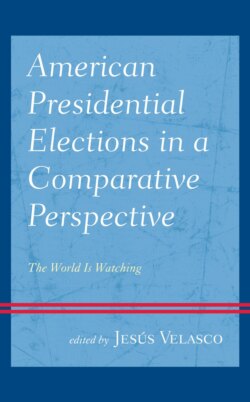Читать книгу American Presidential Elections in a Comparative Perspective - Группа авторов - Страница 35
На сайте Литреса книга снята с продажи.
CONCLUSION
ОглавлениеThe 2016 presidential election was the first US election to take place after Chinese President Xi Jinping came to power in 2012. Drastic changes have since taken place in China, in the United States, and the world at large. With China’s rapid rise as a global power, Chinese perceptions of the United States have undergone important changes as the United States is increasingly perceived by the Chinese as a great power in decline, both in terms of its hard and soft power. China watched closely as the ugliest forces of American politics nearly tore the nation apart. The 2016 presidential election seemed to confirm China’s perception that the United States is losing its battles both at home and abroad. Meanwhile, as China’s negative views of the United States came to a head in 2016, Chinese perceptions of the United States have experienced considerable changes. As the notion of the Chinese Dream became the dominant narrative of China’s political discourse, it seems increasingly likely that the political differences between the two nations will become more pronounced in the future, and the competition between China and the United States in terms of their respective models of development will become more intense. A safe prediction would be that as China’s distrust and disdain of American politics continues to grow, China will become more assertive in its reactions to American influence. It must be pointed out that this is not to predict that conflict between China and the United States is unavoidable. At least for China’s part, it is not yet capable of directly challenging the United States, as much as it still supports the current international norms with words and actions, despite the changes in China-US power distribution.
Meanwhile, no American president has ever walked into the White House with less political and policy experience than Donald Trump, and more than anybody in history, Trump has challenged the basic assumptions of China-US relations that proved true for the past forty years. While Trump prides himself on being unpredictable, strategic ambiguity, either by design or by accident, will only exacerbate mutual strategic distrust and instigate instability in the relationship. Therefore, China faces the challenges of guarding against volatile changes in China-US relations stirred up by a highly unpredictable and provocative American president. It also faces the challenge of managing its expectations for the prospects of China-US relations during the remainder of the Trump presidency. Although Trump’s presidency adds much instability and uncertainty to America’s policy in regard to China, there is still hope that the relationship will make progress under his watch. As America’s primary agenda-setter in foreign policy, President Trump has a great deal of influence over this process.
As China and the United States remain conscious of each other’s power and suspicious of each other’s intentions, the relationship is more likely to witness further deterioration until both sides come to the realization, as they did many times in history, that they have to reach a new “deal” or “framework” of mutual accommodation before things went out of hand. After all, the success of China’s national rejuvenation, as well as the fulfillment of Trump’s campaign promises, demands closer cooperation and less confrontation, whether willingly or grudgingly, from the two largest stakeholders in a chaotic world. Therefore, both countries need to focus more on long-term opportunities rather than short-term difficulties, while adjusting their perceptions of each other and redefining their roles on the global stage. Perhaps one way to escape the Thucydides’s trap, according to Graham Allison, the man who popularized the concept, is for leaders of both nations to have “a surge of strategic imagination as far beyond the current conventional wisdom in DC and Beijing as the remarkable Cold War strategy crafted by statesmen we now celebrate as the ‘wise men’ was beyond the consensus in Washington at the end of World War II.”77 Before that happens, the future of the Sinoamerican relationship remains deeply uncertain, for better or worse.
